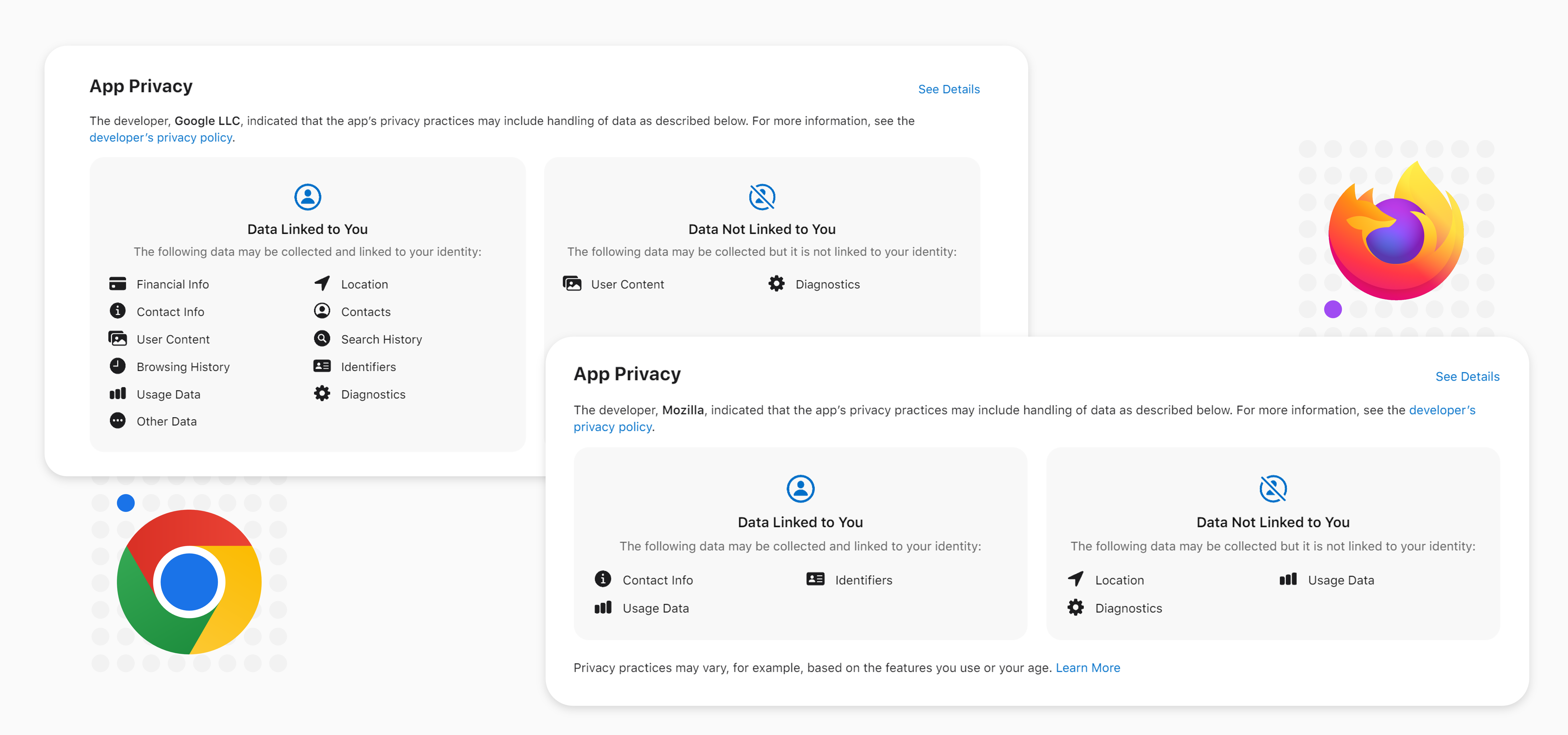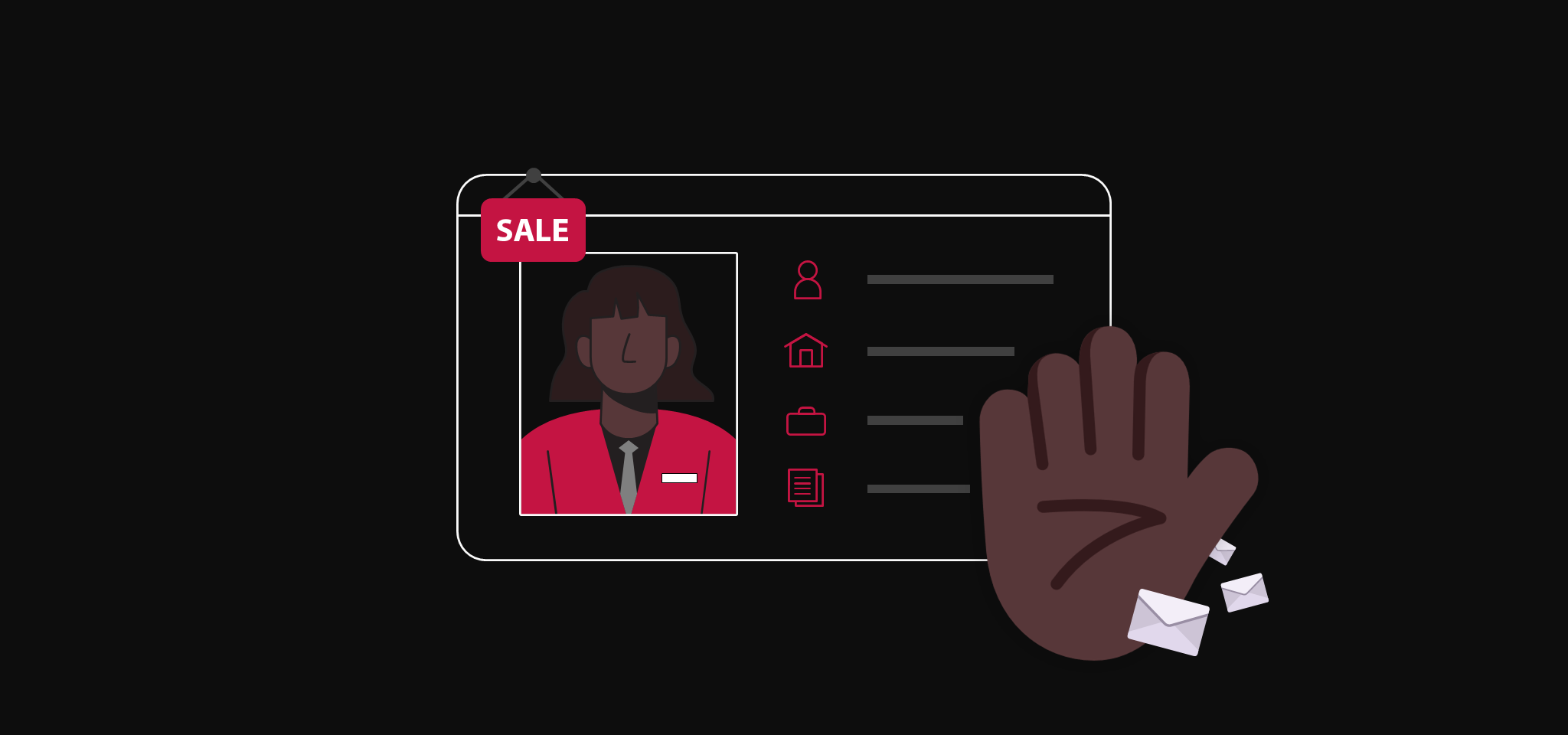✋🏿 You can do better than Chrome
Do you think about what browser you use everyday?
If the answer's no, it's probably Google wants you to not think about choosing one, by controlling your choices. On Android, you'll have a pre-installed version of Chrome and Google which you can't uninstall normally. On iPhones, Google has ensured that it's your default search engine for its Safari browser, by paying Apple upto $12 Billion each year.
At its core, Google is an advertising company, and by having more people on its services, it gets to collect data and build profiles to sell to advertisers and make profits from. So, paying billions to a competitor for the top default-position makes sense. As the UK government’s Competition and Markets Authority says in a 2020 report, "The scale of these payments is striking and demonstrates the value that Google places on these default positions."
So that's classic freedom-stifling monopoly. On the privacy front, Chrome offers sparse controls in form of a basic tracking protection and lags behind every one of its competitors. Unsurprising.

|
Head to head against its closest competitor, Chrome collects too much of your information and offers too little to protect yourself from online trackers and targeted ads. Image: Apple App Store
But when you do look beyond Chrome's colours, you have competing browsers that are in many areas better than Chrome, which you're using likely because Google decided it for you. I've shortlisted a few of my personal favourites here, all with a dedicated focus on privacy and tools I cycle through on a daily basis. (none of them are sponsored or anything, btw.)

|
1. Firefox · Mozilla
With its backing from a non-profit, Mozilla, Firefox has no incentive to harvest your data and sell it, unlike Chrome. If you're looking for the 'new' in your new browser, the 'fox comes with a neat user interface that's more customizable than Chrome's, and nifty features such as its screenshot tool and the advanced PDF reader (among more) that make it apt for productivity.
How Mozilla makes money:
Paid Subscriptions, Royalty-fees (% of ad-revenue when someone uses Google, the default search-engine for Firefox), Sponsored shortcuts' tiles (can be disabled).
Main Privacy Protections:
Tracker-blocking with Enhanced Tracking Protection (ETP) · Total Cookie Protection
What's to covet:
Strong emphasis on privacy both on and off the browser · Customizable user-interface · Non-profit backing · Container Tabs make using multiple accounts easy
What's to regret:
Mozilla's reliant on Google for most its revenue · Default privacy settings need adjusting for higher protection · May be a beat slower than Chrome

|
2. Librewolf
A hardened version of Firefox that removes some of the unwanted stuff from the 'fox, like its Pocket app integration, telemetry, and Google as default search engine. Comes with uBlock Origin, a reliable content-blocker and highest privacy settings in Firefox by default, among other privacy measures. Librewolf is not affiliated to Mozilla, and is an independent community-driven project.
How Librewolf makes money
Doesn't.
Main Privacy Protections:
Tracker-blocking with ETP and uBlock Origin · Total Cookie Protection · Accessible Fingerprinting Protection
What's to covet:
Zero bloatware from Firefox · No incentive for profit · Stronger privacy defaults · Same customizable UI from firefox
What's to regret:
No option for automatic updates · No Android or iOS version · May be a beat slower than Chrome, like Firefox

|
3. Brave · Brave Software
Let's say, you don't want something 'new' but something that just works like Chrome, but with the added privacy. Brave fills in for the role fully, being based on Chromium – the same source code that Chrome runs on. Where this browser differs is its strong and easy to use default tracker protection and a ad-model that rewards you with BAT, if you're willing to see ads.
How Brave makes money:
Paid Subscriptions, Advertising, Affiliate Commissions & Merchandise (can opt-out of ads)
Main Privacy Protections:
'Shields' Tracker-blocking based on filter-lists · Built-in Tor Browsing Mode
What's to covet:
Looks and feels like Chrome; easy to switch to · Faster browsing speeds than Firefox · Strong & accessible default privacy
What's to regret:
Advertising Model and Crypto-features not for everyone · Limited customization options and features compared to Firefox

|
4. Tor · The Guardian Project
Tor shares its UI with Firefox but that's where similarities end. It uses a unique relay network that bounces off your traffic through several (and mostly volunteer-run) servers before connecting you to the site, which doesn't know your IP address. Though nothing can guarantee full anonymity or privacy, Tor can get you both relatively higher than most browsers.
How Tor makes money:
Donations from sponsors
Main Privacy Protections:
IP-address concealment · Script-blocking with in-built NoScript Extension · Letterboxed Window to resist fingerprinting · Automatic cookie deletion after session
What's to covet:
Better privacy compared to most browsers · Helps bypass censorship · Can conceal your online presence from ISPs
What's to regret:
Painfully slow for daily use · Some sites may not load · May trigger CAPTCHA tests frequently
Regardless of which browser you go for, you're better off than Chrome. All of these browsers do not collect what you're browsing, and go beyond to protect cross-site trackers from profiling your behaviour. I personally use them all and encourage to use two at once, with one for browsing (preferably set to clear cookies on exit) and the other for sites to login, like Canva or Gmail.
💡 Dive into the settings once after you install one, and disable telemetry data collection for Brave & Firefox; not required for Librewolf.
That said, if you're curious to know what these browsers are really effective against, here's a good read from EFF. And see you next week, with a read decoding why we all need privacy, followed up with some extensions to beef up your browser's resistance to surveillance.
Light 💛
